THE RECTOR OF MONTEGNAC
The Abbe Gabriel glided softly through the church so as not to disturb the devotions of two groups of persons on the benches near the high altar, which was separated from the nave at the place where the lamp was hung by a rather common balustrade, also of chestnut wood, and covered with a cloth intended for the communion. On either side of the nave a score of peasants, men and women, absorbed in fervent prayer, paid no attention to the stranger when he passed up the narrow passage between the two rows of seats.
When the young abbe stood beneath the lamp, whence he could see the two little transepts which formed a cross, one of which led to the sacristy, the other to the cemetery, he noticed on the cemetery side a family clothed in black kneeling on the pavement, the transepts having no benches. The young priest knelt down on the step of the balustrade which separated the choir from the nave and began to pray, casting oblique glances at a scene which was soon explained to him. The gospel had been read. The rector, having removed his chasuble, came down from the altar and stood before the railing; the young abbe, who foresaw this movement, leaned back against the wall, so that Monsieur Bonnet did not see him. Ten o'clock was striking.
"Brethren," said the rector, in a voice of emotion, "at this very moment a child of this parish is paying his debt to human justice by enduring its last penalty, while we are offering the sacrifice of the mass for the peace of his soul. Let us unite in prayer to God, imploring Him not to turn His face from that child in these his last moments, and to grant to his repentance the pardon in heaven which is denied to him here below. The sin of this unhappy man, one of those on whom we most relied for good examples, can only be explained by his disregard of religious principles."
Here the rector was interrupted by sobs from the kneeling group in mourning garments, whom the Abbe Gabriel recognized, by this show of affection, as the Tascheron family, although he did not know them.
First among them was an old couple (septuagenarians) standing by the wall, their faces seamed with deep-cut, rigid wrinkles, and bronzed like a Florentine medal. These persons, stoically erect like statues, in their old darned clothes, were doubtless the grandfather and the grandmother of the criminal. Their glazed and reddened eyes seemed to weep blood, their arms trembled so that the sticks on which they leaned tapped lightly on the pavement. Next, the father and the mother, their faces in their handkerchiefs, sobbed aloud. Around these four heads of the family knelt the two married sisters accompanied by their husbands, and three sons, stupefied with grief. Five little children on their knees, the oldest not seven years old, unable, no doubt, to understand what was happening, gazed and listened with the torpid curiosity that characterizes the peasantry, and is really the observation of physical things pushed to its highest limit. Lastly, the poor unmarried sister, imprisoned in the interests of justice, now released, a martyr to fraternal affection, Denise Tascheron, was listening to the priest's words with a look that was partly bewildered and partly incredulous. For her, her brother could not die. She well represented that one of the Three Marys who did not believe in the death of Christ, though she was present at the last agony. Pale, with dry eyes, like all those who have gone without sleep, her fresh complexion was already faded, less by toil and field labor than by grief; nevertheless, she had many of the beauties of a country maiden, --a plump, full figure, finely shaped arms, rounded cheeks, and clear, pure eyes, lighted at this instant with flashes of despair. Below the throat, a firm, fair skin, not tanned by the sun, betrayed the presence of a white and rosy flesh where the form was hidden.
The married daughters wept; their husbands, patient farmers, were grave and serious. The three brothers, profoundly sad, did not raise their eyes from the ground. In the midst of this dreadful picture of dumb despair and desolation, Denise and her mother alone showed symptoms of revolt.
The other inhabitants of the village united in the affliction of this respectable family with a sincere and Christian pity which gave the same expression to the faces of all,--an expression amounting to horror when the rector's words announced that the knife was then falling on the neck of a young man whom they all knew well from his very birth, and whom they had doubtless thought incapable of crime.
The sobs which interrupted the short and simple allocution which the pastor made to his flock overcame him so much that he stopped and said no more, except to invite all present to fervent prayer.
Though this scene was not of a nature to surprise a priest, Gabriel de Rastignac was too young not to be profoundly touched by it. As yet he had never exercised the priestly virtues; he knew himself called to other functions; he was not forced to enter the social breaches where the heart bleeds at the sight of woes: his mission was that of the higher clergy, who maintain the spirit of devotion, represent the highest intellect of the Church, and on eminent occasions display the priestly virtues on a larger stage,--like the illustrious bishops of Marseille and Meaux, and the archbishops of Arles and Cambrai.
This little assemblage of country people weeping and praying for him who, as they supposed, was then being executed on a public square, among a crowd of persons come from all parts to swell the shame of such a death,--this feeble counterpoise of prayer and pity, opposed to the ferocious curiosity and just maledictions of a multitude, was enough to move any soul, especially when seen in that poor church. The Abbe Gabriel was tempted to go up to the Tascherons and say,--"Your son and brother is reprieved."















